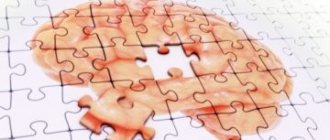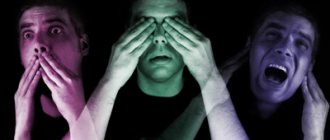Scientists and doctors assure that worries and anxiety are completely normal and in some cases even useful. But there are times when feelings of restlessness and worry may indicate serious mental and anxiety disorders.
- Reasons for appearance
- First symptoms and signs
- Diagnostics
- Modern methods of treatment
What is anxiety
It exists in the form of restless thoughts, tingling in the abdomen, muscle tension, rapid heartbeat or fear of death, neurosis.
This is the so-called “fight or flight” state of the body. Adrenaline is released, the body is ready to run quickly and for a long time or take and deliver blows. This reflex helped us survive in ancient times, and still helps us today. For example, in the event of a fight or quarrel, an upcoming sporting competition, an important exam or a business meeting. However, everyday anxiety and tension can develop into a serious illness. The smallest and most banal stressful situation will leave a much more serious mark on a person’s life. After some unpleasant incident has occurred, a person may experience a condition called anxiety, which lasts for weeks or even months. Due to the fact that such long-term negative effects occur, stress develops into phobias.
A person becomes autistic, stops going to public places, neglects social contacts, breaks off most of his close relationships, suffers from insomnia, begins to get scared and avoid standard life situations. According to statistics, anxiety disorders occur approximately twice as often among women as among men.
Possible consequences
Generalized anxiety disorder, or rather its somatic manifestations, can be indirect causes of the development of a number of real independent diseases. It even happens that the patient does not attach much importance to increased anxiety and unjustified excitement. At the same time, he goes to a medical institution, complaining about:
- disorders of the gastrointestinal tract;
- allergic reactions;
- pathologies of the respiratory system;
- cardiovascular diseases;
- frequent headaches or migraines;
- blood pressure surges;
- skin rashes and infections;
- joint diseases.
Reluctance to accept any kind of uncertainty develops into a constant expectation of something bad. The brain simply gives out its reaction to the stimulus, without analyzing the situation at all. This anxiety is so mentally exhausting and tiring that a person does not want to do anything. Even banal household chores are accomplished with great difficulty and force. There is a risk that GAD will eventually be joined by a depressive state.
Symptoms of Anxiety Disorder
Symptoms of this disease include signs such as:
- Spontaneous unreasonable fear of a certain object or in a certain situation
- Increased heart rate and breathing
- High blood pressure
- Trembling and weakness in the limbs
- Excessive sweating
- Stifling breath
- Headaches and dizziness
- Loss of speech
- Increase or decrease in body temperature
- Dry mouth
- Violations
- Nausea
- Feelings of detachment
- Fear of losing control or death
- Redness
- Anorexia or gluttony
- Constant weakness in the legs
- Frequent feeling of “butterflies flying in the stomach”
- Numbness of the limbs
- Weakening of sexual desire
- Diagnosis of anxiety disorders
If you notice the above symptoms, experience difficulties with unreasonable fears, or cannot feel comfortable in public places, then you should consult your family doctor. If you are uncomfortable or scared to go alone, then take a loved one with you.
To diagnose anxiety disorders, a clinical interview form and various questionnaires are used. The doctor will find out and correlate your condition and your complaints with one or more items on the list of possible diseases and select treatment for the anxiety disorder that is tormenting you.
How to get rid of anxiety and worry on your own
General techniques for reducing anxiety that a person can use independently.
First of all, you need to come to the realization that worrying does not mean thinking and does not mean deciding! That is why the patient’s main task is to move from the experiencing mode to the decision mode. And in order for a solution to come, it is enough to simply write down the problem and deal with it piece by piece.
Next, you should remember and remember well the advice of the Eastern sages, who suggest limiting yourself only to the framework of the current moment, that is, shifting the focus exclusively “to the here and now.” Directing attention to the plane of the moment, including anxiety in the body, is achieved through meditative and breathing practices. In general, Understanding the existentiality of being and accepting the idea of death is a general recommendation for people suffering from any neuroses.
Diseases related to anxiety disorders
Panic disorder
A panic attack is a short, discrete attack of intense discomfort, anxiety, and fear, occurring along with signs that express the cognitive and somatic aspects of the disease.
Factors that cause a panic attack are:
- The body releases adrenaline, serotonin and other neurotransmitters into the blood. It is this substance that causes a restless state in a person, supplemented by seizures.
- Hereditary factor. Panic disorders and diseases of a similar syndrome are inherited with a probability of fifteen to twenty percent. In identical twins, if one of them has the disease, this percentage rises to eighty to ninety.
- Panic attacks are most common in the age group from twenty-five to sixty-four years. Appears against the background of a stressful situation. For example, experiencing a disaster, the death of relatives, during an acute conflict. It may appear after taking drugs or during alcohol intoxication. In total, the panic attack lasts about half an hour, reaching its peak within the first ten minutes. During an attack, there may be a feeling of unreality of what is happening, everything around is new and unusual, like in a nightmare.
Agoraphobia
Translated from Greek, the word Agoraphobia is translated as fear of open places.
Agoraphobia is a type of anxiety disorder that is expressed in the fear of getting into a stressful situation or having a panic attack. It is also manifested by the need to find a door or other escape route in a constant field of view. It is the most common of all anxiety disorders, affecting about five percent of the world's population.
Agoraphobes fear and avoid places and situations such as:
- Public places: grocery stores, restaurants, cinemas, shopping centers.
- Confined spaces: narrow streets, bridges, tunnels, etc.
- Leave your apartment or be alone in it
- Public transport: buses, metro, planes, etc.
It should be noted that people are not afraid of the places themselves, but of the awkward situations that can happen to them there. The fear is not so much of the panic attack itself, but of what people will think. A person feels helpless, closes himself off from society, and is constantly close to his family.
Generalized anxiety disorder
Generalized anxiety disorder is a disease characterized by generalized, persistent anxiety. Accompanied by muscle tension, nervousness, pain in the solar plexus area. The usual duration is approximately a year.
There are no panic attacks or phobias with this disease. Anxiety is aimed at everyday issues and problems: study, work, financial situation, love relationships. Constant thoughts on issues that concern a person become annoying and lead to depression. This causes the patient to develop general weakness, muscle tension, and sleep disturbances. The disorder can begin to develop at any age.
Why such a disease occurs is a complex question; there is no clear answer to it. Typical factors are heredity, possible childhood trauma, due to excessive psychological pressure, inflated expectations.
Obsessive-compulsive disorder
Obsessive-compulsive disorder is a condition when the patient experiences obsessive thoughts, the appearance of a certain image, or an urge to perform the same actions or certain rituals. This condition, as a result, causes discomfort and anxiety in a person. To alleviate his condition, a person performs various ritual actions that help him cope with his thoughts.
The disease affects approximately five percent of the population. It is expressed in such a way that a person worries about the possible incorrectness of his behavior or imagines a fire when thinking about a forgotten iron. A person has to struggle not only with thoughts, but also with behavior. Over time, a large number of patients note that the symptoms improve on their own, but do not disappear completely.
Selective mutism
Selective mutism is a disorder in which a person is deprived of speech for some time, finding himself in a stressful situation that makes connections between people and communication with them, and can only produce various sounds, without collecting them into words. The frightened body seems to say - cancellation of the speech organs.
This disorder is usually accompanied by shyness and social anxiety. The patient will remain silent without creating dependence on prohibition factors, even if he is threatened with severe punishment for this or he risks finding himself in a very shameful situation. This disease is quite rare, affecting only 0.8 percent of the population.
Situational anxiety
Situational anxiety is an inherent anxiety disorder that occurs as a result of moving to a new place, a change of environment, or an unexpected event. This is a very common type of anxiety. It can be at the level of a disease and cause a panic attack, or it can simply appear for a short time in a healthy person, during an important decision in life. A situation that makes one person feel anxious may not affect another person at all.
Main symptoms of TR
All possible signs of TR are divided into physical and psychological. Physical symptoms include:
- rapid pulse;
- labored breathing;
- dizziness and headaches;
- feeling of tightness in the chest;
- shiver;
- heartache;
- numbness of the limbs;
- increased sweating;
- pain in the stomach, heart;
- nausea;
- hot flashes;
- violation of thermoregulation;
- insomnia;
- general weakness.
Psychological symptoms include a feeling of fear, insensitivity to reality, disorientation, and causeless panic.
Regimen for the treatment of anxiety disorder
Anxiety disorders need to be treated in two ways, they are as follows: psychotherapy and medication.
- Psychotherapeutic treatment uses cognitive behavioral therapy as the main method. This treatment takes place in the format of conversations between a psychiatrist and his patients. The basis of this method is to change your vision of a stressful situation, to teach you to direct the flow of thoughts in a different direction. The essence of anxiety disorders is that it is not the situation that prevents a person from living, but his vision of this very situation. Thus, by changing your attitude towards the situation, you can get rid of the problem. The therapist will help you understand yourself, understand which thoughts do not want to leave you alone and why. You will be able to change stable thinking patterns and look at the world from different angles. The therapist will tell you how to control yourself using proper breathing and relaxation techniques. You will need to complete a course consisting of an average of fifteen to twenty lessons. You will be taught skills and knowledge that will help you gradually get rid of anxiety and panic attacks.
- Medicinal treatment methods involve taking various drugs. Usually they start with antidepressants, they affect the level of serotonin and norepinephrine in the body, affect the suppression of anxiety and fear, and eliminate depression. A dose of medication will need to be taken every day for everything to work effectively. If you have started taking a course of pills, you cannot interrupt the treatment yourself. During treatment, doctors will prohibit the use of alcohol.
Anxiety disorders often cause insomnia; to restore a healthy sleep pattern, the patient is prescribed sleeping pills. Sleeping pills act for their intended purpose: they speed up falling asleep and prolong sleep.
One of the medications used to treat anxiety is sleeping pills. Sleep pills will have such effects that they will reduce the feeling of fear and anxiety. These drugs multiply the effect of gamma-aminobutyric acid, which in turn produces an inhibitory effect on brain cells and thereby calms. It also relaxes muscles and helps relieve tension.
For patients whose anxiety disorders go away along with manifestations of violence, due to clouding of the mind, a dose of tranquilizers is also administered in small doses.
Modern methods of treatment
To treat an anxiety disorder, you will need several psychotherapeutic sessions that will allow you to establish the exact cause of this condition, as well as determine the necessary medications. Antidepressants and various anti-anxiety medications are usually prescribed.
In case of excitement of the nervous system, doctors prescribe Afobazole.
Unlike many other disorders and mental illnesses, anxiety disorder is quite manageable. If the diagnosis is confirmed, then you should definitely take the prescribed medications. This will make life much easier for yourself and those around you. With the right medications and following the course of treatment, there will be no dependence on medications.
Bottom line
Thus, we can say that anxiety disorders cause great harm to the body and interfere with living in society. If you or your loved one suffers from mental disorders, be sure to consult a doctor. Even the most minor symptoms will progress over time. So a couple of obsessive thoughts will result in sleepless nights, causing damage to the autonomic and nervous system, and the psyche as a whole.
Self-medication is also not worth it, psyche is a very delicate and complex science, wrong actions can only aggravate the situation, you need to turn to practicing specialists. You can find such people in our clinic in Moscow. Go to the website, there you can find more information, other equally important articles on treatment about anxiety disorder. Convince yourself of the professionalism and level of our assistance.
Call us and we will answer your questions. 24-hour reception, many experienced psychiatrists are always at work. Our policy is to provide high quality services and low prices. Our clinic has always received guests with due hospitality and will always be happy to receive patients under its best conditions. Don’t let your illness get worse, contact us for treatment for disorders, your health is very important.
Reasons for appearance
No one has yet been able to find out the exact origin of this disorder. The reasons for its appearance may be:
- chronic heart disease, regular hormonal imbalances, serious circulatory problems;
- use and abrupt cessation of psychotropic drugs, alcoholism, drug use;
- head injury and complications;
- prolonged stress and depression;
- constant presence in a melancholic mood;
- suffered mental disorders in early childhood or as a result of difficult life situations;
- mental illness (paranoia, schizophrenia).








